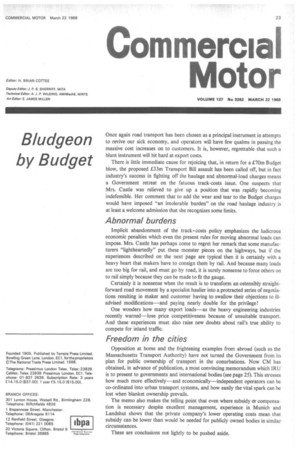Bludgeon by Budget
Page 25

If you've noticed an error in this article please click here to report it so we can fix it.
Once again road transport has been chosen as a principal instrument in attempts to revive our sick economy, and operators will have few qualms in passing the massive cost increases on to customers. It is, however, regrettable that such a blunt instrument will hit hard at export costs.
There is little immediate cause for rejoicing that, in return for a ElOm Budget blow, the proposed £33m Transport Bill assault has been called off, but in fact industry's success in fighting off the haulage and abnormal-load charges means a Government retreat on the fatuous track-costs issue. One suspects that Mrs. Castle was relieved to give up a position that was rapidly becoming indefensible. Her comment that to add the wear and tear to the Budget charges would have imposed "an intolerable burden" on the road haulage industry is at least a welcome admission that she recognizes some limits.
Abnormal burdens
Implicit abandonment of the track-costs policy emphasizes the ludicrous economic penalties which even the present rules for moving abnormal loads can impose. Mrs. Castle has perhaps come to regret her remark that some manufacturers "lightheartedly" put these monster pieces on the highways, but if the experiences described on the next page are typical then it is certainly with a heavy heart that makers have to consign them by rail. And because many loads are too big for rail, and must go by road, it is surely nonsense to force others on to rail simply because they can be made to fit the gauge.
Certainly it is nonsense when the result is to transform an ostensibly straightforward road movement by a specialist haulier into a protracted series of negotiations resulting in maker and customer having to swallow their objections to illadvised modifications—and paying nearly double for the privilege!
One wonders how many export loads—as the heavy engineering industries recently warned—lose price competitiveness because of unsuitable transport. And these experiences must also raise new doubts about rail's true ability to compete for inland traffic.
Freedom in the cities
Opposition at home and the frightening examples from abroad (such as the Massachusetts Transport Authority) have not turned the Government from its plan for public ownership of transport in the conurbations. Now CM has obtained, in advance of publication, a most convincing memorandum which IRU is to present to governments and international bodies (see page 25). This stresses how much more effectively—and economically—independent operators can be co-ordinated into urban transport systems, and how easily the vital spark can be lost when blanket ownership prevails.
The memo also makes the telling point that even where subsidy or compensation is necessary despite excellent management, experience in Munich and Landshut shows that the private company's lower operating costs mean that subsidy can be lower than would be needed for publicly owned bodies in similar circumstances.
These are conclusions not lightly to be pushed aside.












































































































